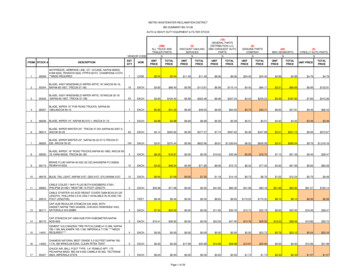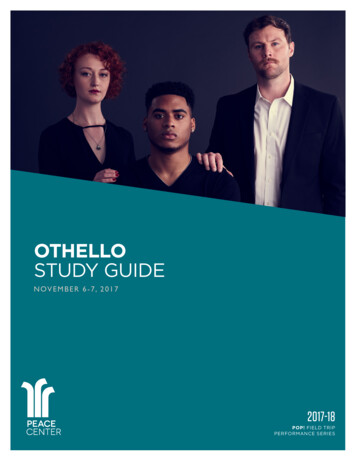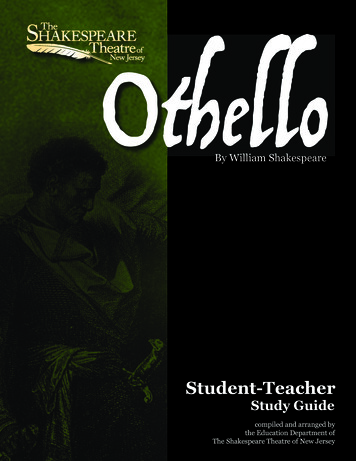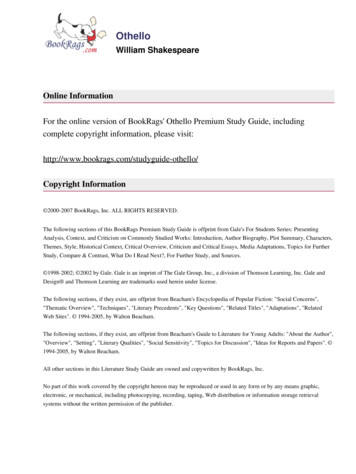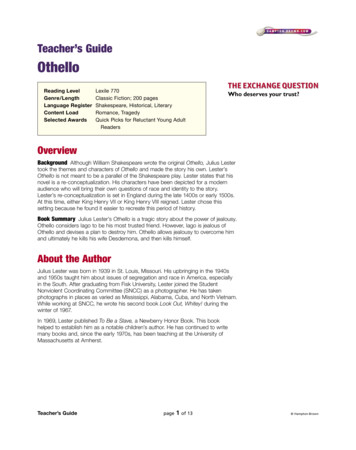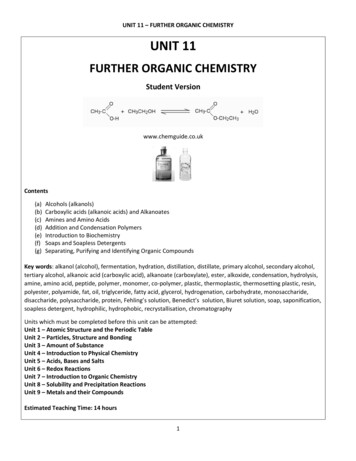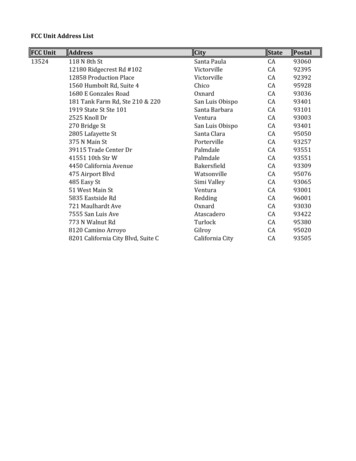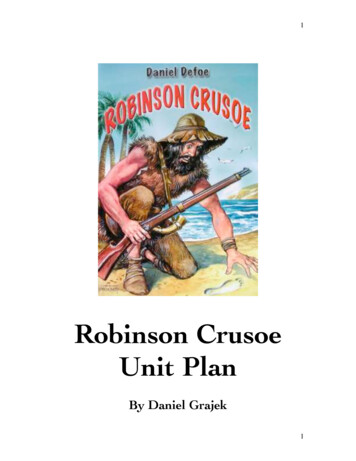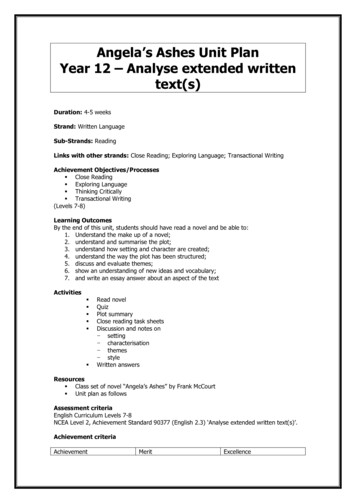
Transcription
OTHELLOA UNIT PLANSecond EditionBased on the play by William ShakespeareWritten by Mary B. CollinsTeacher's Pet Publications, Inc.11504 Hammock PointBerlin, Maryland 21811Copyright Teacher's Pet Publications, Inc.1996, 1999
This LitPlan for William Shakespeare’sOthellohas been brought to you by Teacher’s Pet Publications, Inc.Copyright Teacher’s Pet Publications 199911504 Hammock PointBerlin MD 21811Only the student materials in this unit plan (such as worksheets,study questions, and tests) may be reproduced multiple timesfor use in the purchaser’s classroom.For any additional copyright questions,contact Teacher’s Pet ompuserve.com
TABLE OF CONTENTS - OthelloIntroduction11Unit Objectives13Reading Assignment Sheet14Unit Outline15Study Questions (Short Answer)17Quiz/Study Questions (Multiple Choice)23Pre-reading Vocabulary Worksheets34Lesson One (Introductory Lesson)46Nonfiction Assignment Sheet49Oral Reading Evaluation Form53Writing Assignment 155Writing Assignment 261Writing Assignment 375Writing Evaluation Form62Vocabulary Review Activities60Extra Writing Assignments/Discussion ?s65Unit Review Activities77Unit Tests79Unit Resource Materials112Vocabulary Resource Materials1243
ABOUT THE AUTHORWILLIAM SHAKESPEARESHAKESPEARE, William (1564-1616). For more than 350 years, William Shakespeare has beenthe world's most popular playwright. On the stage, in the movies, and on television his plays arewatched by vast audiences. People read his plays again and again for pleasure. Studentsreading his plays for the first time are delighted by what they find.Shakespeare's continued popularity is due to many things. His plays are filled with action, hischaracters are believable, and his language is thrilling to hear or read. Underlying all this isShakespeare's deep humanity. He was a profound student of people and he understood them. He hada great tolerance, sympathy, and love for all people, good or evil.While watching a Shakespearean tragedy, the audience is moved and shaken. After the show thespectators are calm, washed clean of pity and terror. They are saddened but at peace, repeating theold saying, "There, but for the grace of God, go I."A Shakespearean comedy is full of fun. The characters are lively; the dialogue is witty. In the endyoung lovers are wed; old babblers are silenced; wise men are content. The comedies are joyous andromantic.Boyhood in StratfordWilliam Shakespeare was born in Stratford-upon-Avon, England, in 1564. This was the sixth yearof the reign of Queen Elizabeth I. He was christened on April 26 of that year. The day of his birthis unknown. It has long been celebrated on April 23, the feast of St. George.He was the third child and oldest son of John and Mary Arden Shakespeare. Two sisters, Joan andMargaret, died before he was born. The other children were Gilbert, a second Joan, Anne, Richard,and Edmund. Only the second Joan outlived William.Shakespeare's father was a tanner and glovemaker. He was an alderman of Stratford for years. Healso served a term as high bailiff, or mayor. Toward the end of his life John Shakespeare lost mostof his money. When he died in 1601, he left William only a little real estate. Not much isknown about Mary Shakespeare, except that she came from a wealthier family than her husband.Stratford-upon-Avon is in Warwickshire, called the heart of England. In Shakespeare's day it waswell farmed and heavily wooded. The town itself was prosperous and progressive.The town was proud of its grammar school. Young Shakespeare went to it, although when or for howlong is not known. He may have been a pupil there between his 7th and 13th years. His studies musthave been mainly in Latin. The schooling was good. All four schoolmasters at the school duringShakespeare's boyhood were graduates of Oxford University.4
Nothing definite is known about his boyhood. From the content of his plays, he must have learnedearly about the woods and fields, about birds, insects, and small animals, about trades and outdoorsports, and about the country people he later portrayed with such good humor. Then and later hepicked up an amazing stock of facts about hunting, hawking, fishing, dances, music, and other artsand sports. Among other subjects, he also learned about alchemy, astrology, folklore, medicine, andlaw. As good writers do, he collected information both from books andfrom daily observation of the world around him.Marriage and Life in LondonIn 1582, when he was 18, he married Anne Hathaway. She was from Shottery, a village a mile fromStratford. Anne was seven or eight years older than Shakespeare. From this difference in their ages,a story arose that they were unhappy together. Their first daughter, Susanna, wasborn in 1583. In 1585 a twin boy and girl, Hamnet and Judith, were born.What Shakespeare did between 1583 and 1592 is not known. Various stories are told. He may havetaught school, worked in a lawyer's office, served on a rich man's estate, or traveled with a companyof actors. One famous story says that about 1584 he and some friends were caught poaching on theestate of Sir Thomas Lucy of Carlecote, near Warwick, and were forced to leave town. A less likelystory is that he was in London in 1588. There he was supposed to have held horses for theaterpatrons and later to have worked in the theaters as a callboy.By 1592, however, Shakespeare was definitely in London and was already recognized as an actorand playwright. He was then 28 years old. In that year he was referred to in another man's book forthe first time. Robert Greene, a playwright, accused him of borrowing from the plays ofothers.Between 1592 and 1594, plague kept the London theaters closed most of the time. During these yearsShakespeare wrote his earliest sonnets and two long narrative poems, 'Venus and Adonis' and 'TheRape of Lucrece'. Both were printed by Richard Field, a boyhood friend from Stratford. They werewell received and helped establish him as a poet.Shakespeare ProspersUntil 1598 Shakespeare's theater work was confined to a district northeast of London. This wasoutside the walls, in the parish of Shoreditch. Located there were two playhouses, the Theatre andthe Curtain. Both were managed by James Burbage, whose son Richard Burbage was Shakespeare'sfriend and the greatest tragic actor of his day.Up to 1596 Shakespeare lived near these theaters in Bishopsgate, where the North Road entered thecity. Sometime between 1596 and 1599, he moved across the Thames River to a district calledBankside. There, two theaters, the Rose and the Swan, had been built by PhilipHenslowe. He was James Burbage's chief competitor in London as a theater manager.5
The Burbages also moved to this district in 1598 and built the famous Globe Theatre. Its signshowed Atlas supporting the world-hence the theater's name. Shakespeare was associated with theGlobe Theatre for the rest of his active life. He owned shares in it, which brought him much money.Meanwhile, in 1597, Shakespeare had bought New Place, the largest house in Stratford. During thenext three years he bought other property in Stratford and in London. The year before, his father,probably at Shakespeare's suggestion, applied for and was granted a coat of arms. Itbore the motto Non sanz droict-Not without right. From this time on, Shakespeare could write"Gentleman" after his name. This meant much to him, for in his day actors were classed legally withcriminals and vagrants.Shakespeare's name first appeared on the title pages of his printed plays in 1598. In the same yearFrancis Meres, in 'Palladis Tamia: Wit's Treasury', praised him as a poet and dramatist. Meres'scomments on 12 of Shakespeare's plays showed that Shakespeare's genius was recognized in his owntime.Honored As Actor and PlaywrightQueen Elizabeth I died in 1603. King James I followed her to the throne. Shakespeare's theatricalcompany was taken under the king's patronage and called the King's Company. Shakespeare and theother actors were made officers of the royal household. The theatrical company was the mostsuccessful of its time. Before it was the King's Company, it had been known as the Earl of Derby'sand the Lord Chamberlain's. In 1608 the company acquired the Blackfriars Theatre. This was asmaller and more aristocratic theater than the Globe. Thereafter the company alternated between thetwo playhouses.Plays by Shakespeare were performed at both theaters, at the royal court, and in the castles of thenobles. After 1603 Shakespeare probably acted little, although he was still a good actor. His favoriteroles seem to have been old Adam in 'As You Like It' and the Ghost in 'Hamlet'.In 1607, when he was 43, he may have suffered a serious physical breakdown. In the same year hisolder daughter Susanna married John Hall, a doctor. The next year Shakespeare's first grandchild,Elizabeth, was born. Also in 1607 his brother Edmund, who had been an actorin London, died at the age of 27.The Mermaid Tavern GroupAbout this time Shakespeare became one of the group of now-famous writers who gathered at theMermaid Tavern in Cheapside. The club was formed by Sir Walter Raleigh. Ben Jonson was itsleading spirit (see Jonson). Shakespeare was a popular member. He was admired for his talent andloved for his kindliness. Thomas Fuller, writing about 50 years later, gave an amusing account ofthe conversational duels between Shakespeare and Jonson:"Many were the wit-combats betwixt him and Ben Jonson; which two I behold like a Spanish greatgalleon and an English man-of-war; Master Jonson (like the former) was built far higher in learning;6
solid, but slow, in his performances. Shakespeare, with the English man-of-war, lesser in bulk, butlighter in sailing, could turn with all tides, tack about, and take advantage of all winds, by thequickness of his wit and invention."Jonson sometimes criticized Shakespeare harshly. Nevertheless he later wrote a eulogy ofShakespeare that is remarkable for its feeling and acuteness. In it he said:Leave thee alone, for the comparisonOf all that insolent Greece or haughty RomeSent forth, or since did from their ashes come.Triumph, my Britain, thou hast one to showTo whom all scenes of Europe homage owe.He was not of an age, but for all time!. . . . . . . . . . . . . . .Sweet Swan of Avon! what a sight it wereTo see thee in our waters yet appear,And make those flights upon the banks of Thames,That so did take Eliza, and our James!Death and Burial at StratfordShakespeare retired from his theater work in 1610 and returned to Stratford. His friends from Londonvisited him. In 1613 the Globe Theatre burned. He lost much money in it, but he was still wealthy.He shared in the building of the new Globe. A few months before the fire he bought as an investmenta house in the fashionable Blackfriars district of London.On April 23, 1616, Shakespeare died at the age of 52. This date is according to the Old Style, orJulian, calendar of his time. The New Style, or Gregorian, calendar date is May 3, 1616. He wasburied in the chancel of the Church of the Holy Trinity in Stratford.A stone slab-a reproduction of the original one, which it replaced in 1830-marks his grave. It bearsan inscription, perhaps written by himself.On the north wall of the chancel is his monument. It consists of a portrait bust enclosed in a stoneframe. Below it is an inscription in Latin and English. This bust and the engraving by MartinDroeshout, prefixed to the First Folio edition of his plays (1623), are the only pictures ofShakespeare which can be accepted as showing his true likeness.John Aubrey, an English antiquarian, wrote about Shakespeare 65 years after the poet's death. Heevidently used information furnished by the son of one of Shakespeare's fellow actors. Aubreydescribed him as "a handsome, well-shaped man, very good company, and of a ready and pleasantsmooth wit."Shakespeare's will, still in existence, bequeathed most of his property to Susanna and her daughter.He left small mementoes to friends. He mentioned his wife only once, leaving her his "second bestbed" with its furnishings.7
Much has been written about this odd bequest. There is little reason to think it was a slight. Indeed,it may have been a special mark of affection. The "second best bed" was probably the one they used.The best bed was reserved for guests. At any rate, his wife was entitled by law to one third of herhusband's goods and real estate and to the use of their home for life. She died in 1623.The will contains three signatures of Shakespeare. These, with three others, are the only knownspecimens of his handwriting in existence. Several experts also regard some lines in the manuscriptof 'Sir Thomas More' as Shakespeare's own handwriting. He spelled his name invarious ways. His father's papers show about 16 spellings. Shakspere, Shaxpere, and Shakespeareare the most common.Did Shakespeare Really Write the Plays?The outward events of Shakespeare's life are ordinary. He was hard-working, sober, and middle-classin his ways. He steadily gathered wealth and took good care of his family. Many people have foundit impossible to believe that such a man could have written the plays. They feel that he could nothave known such heights and depths of passion. They believe that the people around Shakespeareexpressed little realization of his greatness. Some say that a man of his little schooling could nothave learned about the professions, the aristocratic sports of hawking and hunting, the speech andmanners of the upper classes.Since the 1800's there has been a steady effort to prove that Shakespeare did not write the plays orthat others did. For a long time the leading candidate was Sir Francis Bacon. Books on theShakespeare-Bacon argument would fill a library (see Bacon, Francis). After Bacon became lesspopular, the Earl of Oxford and then other men were suggested as the authors. Nearly every famousElizabethan was named. The most recent
Othello has been brought to you by Teacher’s Pet Publications, Inc. Copyright Teacher’s Pet Publications 1999 11504 Hammock Point Berlin MD 21811 Only the student materials in this unit plan (such as worksheets, study questions, and tests) may be reproduced multiple times for use in the purchaser’s classroom. For any additional copyright questions,
